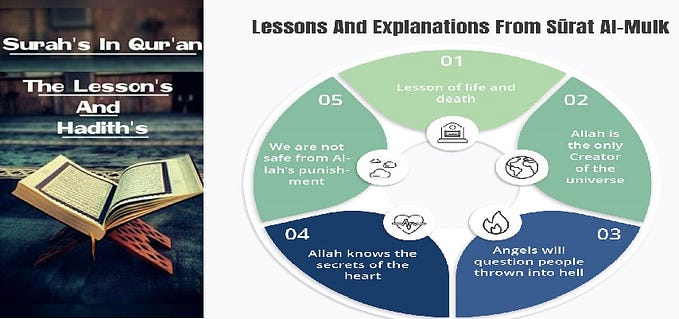Some Surahs Reciting Benefits of the Quran

Learning the Quran requires dedication and determination. Quran is usually memorized by reading loudly but not very loudly. Just pick the first few names and recite them loudly, to the extent where you can hear yourself speak. After reciting the names a few times, try to recite them on your own without looking.
Reading and Reflecting Over the Quran, one fulfills an obligation and is rewarded for it. Upon fulfilling this obligation, the Quran then becomes a witness for one on the Day of Judgment. The Holy Prophet says, “the Quran is a proof for you or against you.”
The rest of the Surah is a beautiful blend of history, life lessons, and instructions.
Surah Al-Mulk
The meaning of the name Mulk is “ Kingdom, sovereignty, supreme “.It is a very important surah in The Holy Quran. According to the Prophet Muhammad (PBUH), who so ever recited and memorize this verse, in return, he will be defended until and unless he is sent into paradise. However, Abdullah Ibn Abbas said that it was the wish of Prophet that Surah Mulk must be in the heart of every Muslim. It saves man from the torment of the grave.
Surah al Mulk draws attention to the expanse and subtlety of creation as a Sign for the majesty and power of the all-Compassionate. Summarily, the message of the Surah can be divided into four parts:
Invitation to witness and reflect upon the Signs of Allah in the expanse and subtlety of creation: Ayahs 1–4,19
Signs for the fragility of life on this planet: Ayahs 5, 16, 17, 20, 21, 28, 30,
Signs in the bounties from the Sustainer: 23, 24,
The discomfiture of those who reject the Signs and the inner peace of those who accept them: 6–11, 13, 14, 15, 18, 21, 22, 25, 26, 27, 29.
Surah Al-Fatiha
This is the beginning of the Holy Quran. Muslims recite this Surah for numerous times. It is comprised of only seven verses. However, the importance of this Surah Fatiha is just because it has several names, and each name has its own meaning and importance.

The Three Quls
These three Quls in the Quran comes at the end of the Holy Book. It is stated that whenever our Prophet Muhammad PBUH used to recite these Three Quls when he goes to bed, he blows over hands and rub it to the specific areas. So, nothing will harm him from any mishap if someone aimed over him.
The ‘Three Quls’ are the last three chapters (Surahs) in the Qur’an. They are commonly known as:
“Qul huwa Allāhu Aḥad” (Sūrah Al-Ikhlāṣ)
“Qul A’ūdhu birabbi al-falaq” (Sūrah Al-Falaq)
“Qul A’ūdhu birabbi al-nās” (Sūrah Al-Nās)
What applies to “Ayatul-Kursi” is applicable to the “Three Quls” in the ways and the times we recite them for protection. Thus, we recite each of them once, after each prayer (ṣalāh). We also recite them three times each, before going to bed.

Ayat Al-Kursi
Ayat al-Kursi is regarded as one of the most powerful ayahs in the Quran because when it is recited, the greatness of God is believed to be confirmed. Muslims used to recite this Surah for the sake of care and protection from mishap if aimed at him. Similarly, Ayat Al-Kursi protects man from the Shaytan. So, you must memorize surahs that assist you for the rest of your life for both lives.
Ayatul Kursi is in the Surah Al-Baqarah the second Surah of the Quran. It is the 255th number verse of Surah Al-Baqarah which defines how nobody and nothing is considered to be comparable to Allah.

Conclusion
To conclude, It is different from the other chapters of the Holy Quran recitation is one of the most blessed actions that any Muslim can do the First Chapter of the Quran, is recited in every unit of prayer, and some units of prayer also involve recitation of all or part of any other surah.









